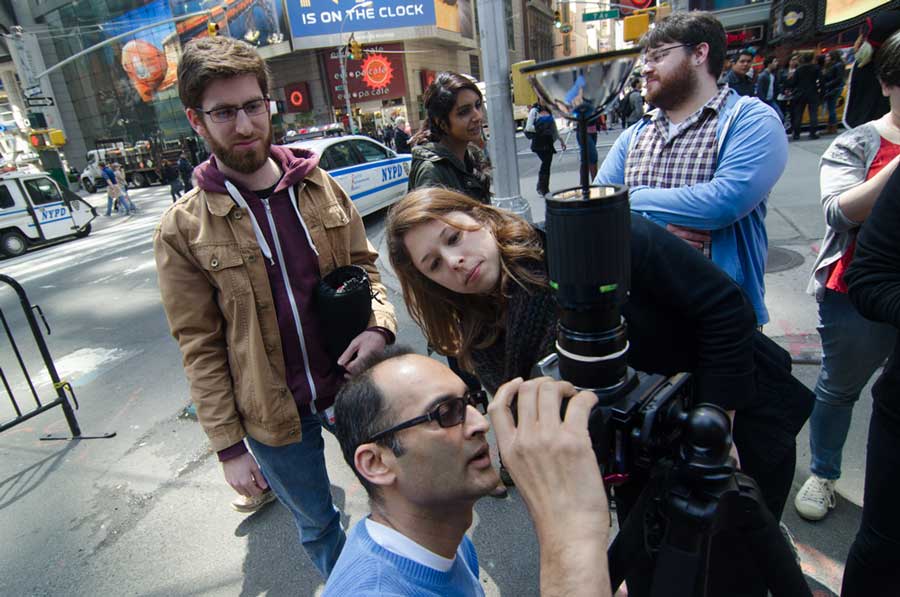After a nine-year tenure as the founding dean of the CUNY Graduate School of Journalism, Stephen B. Shepard has announced that he will step down from the post at the end of the year. Shepard was honored at the J-School gala on May 15. Here is an excerpt of the remarks he delivered on that occasion.
WHEN I FIRST CONSIDERED taking on the role of founding dean of a brand new journalism school, I initially thought of it as a personal capstone – the culmination of a lifetime in journalism and a chance to pass on my experience to the next generation. Boy, was I wrong. As the journalism world changed in content and delivery, I was the one who became a student.
To be perfectly candid, the new world seemed upside down to me. In the traditional world I knew best, we journalists took great pride in acting as trustworthy gatekeepers, professionals who filtered the news for you, who sifted through the glut of information to tell you what was important and why – and who uncovered stories you wouldn’t think of asking for on a Google search.
Suddenly, our traditional model was shattered. The people formerly known as the audience could now talk back. In fact, anyone could now be a journalist – or at least commit an act of journalism on their blogs or websites. Then, all of a sudden there was something called Twitter, something called Facebook. As journalism became decentralized, we professionals were dethroned. It was a psychic shock, a loss of esteem, as well as a loss of livelihood for many people.
Not surprisingly, my instinct was to be defensive – to protect the world I knew and treasured. Only gradually, and sometimes with great reluctance, did I come to see the value of the new technologies. Only gradually did I realize that digital technology would enrich journalism, creating an interactive, multimedia form of storytelling that invited community participation, that could be personalized, that could be delivered on a vast array of mobile devices, that could be consumed globally, that could be distributed using social media. And so, slowly, I finally managed to embrace the changes necessary to create a new school for a new age.

CUNY J-School Prof. Sandeep Junnarkar shows students how to use a GoPano attachment with a DSLR camera, turning photos and videos into panoramas.
(Photo © Skyler Reid)
My personal passage is, of course, a microcosm of the larger struggle within the journalism profession to come to terms with the digital reckoning. Though many mainstream media companies have been hollowed out by all those layoffs, a parallel universe is slowly growing in journalism. Everywhere you look, new digital outlets are springing up that offer promising alternatives – from Politico and ProPublica to the Texas Tribune and Kaiser Health News, to say nothing of blogs, websites, and hyperlocal ventures. This year, something called Inside Climate News won a Pulitzer Prize for National Reporting, and a blog named California Watch was a Pulitzer finalist for Public Service. There is more journalism produced today by more people on more platforms than ever before. And much of it is reaching new audiences through social media, creating new communities of like-minded readers.
No, the real problem is not journalism per se. The defining issue is now financial: The traditional business model that sustained journalism, based largely on a lucrative stream of advertising revenue, has seriously eroded.
The new technologies, as dazzling as they seem, are but a means to an overriding end. And that end is journalism.
I am not a futurist. I do not claim to know how the public will consume media 10 years from now or what the next Twitter will be. But I do believe that we will find new revenue streams for quality journalism in the digital age. Readers are now starting to pay for content, advertisers are developing new ways to target digital readers, and publishers are learning to use e-commerce. Some publishers are even becoming more than just newspapers and magazines; they are learning to be information platforms for their communities, building deeper relationships with their communities – whether those communities are geographic or demographic.
In this new era, and whatever the new formats, I think we must keep technological change in perspective. The new technologies, as dazzling as they seem, are but a means to an overriding end. And that end is journalism.
And I mean a special kind of journalism – a journalism that is vitally needed in this era of media fragmentation and information overload. I’m talking about in-depth reporting, community engagement, analysis, deep understanding – and, yes, something approaching wisdom. This is the stuff of great journalism.
Our children will get this wisdom delivered in new ways, perhaps even sent to a wireless appliance implanted in their brains. So be it. But I believe, in the smithy of my soul, that even if the medium ultimately changes – and it will – the intellectual need, the human need, for thoughtful journalism will never, ever go away. ■





2 Comments